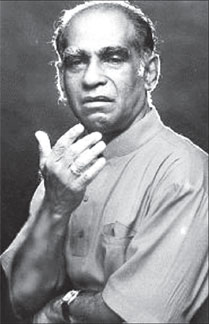|
Amaradeva:
Felicitating a golden voice
By Kalakeerthi Edwin Ariyadasa
|

Dr. W.D.Amaradeva |
“Music is well said to
be the speech of angels.” -
Thomas Carlyle 1795-1881
(British Pandit)
“Music, the greatest
good that mortals know, and all of heaven we have below.”
- Joseph Addison 1672-1719
(English poet)
At the time Amaradeva was born, way back in 1927, in all probability,
the planets themselves were at a merry-making gala, singing in full
swing, their immortal ditties. The incipient traces of the echoes of
those celestial chants would have found their way into the tiny soul of
infant Albert Perera (who eventually grew up into Amaradeva) mingled
with the eternal rhythms of the sea, that formed the backdrop to
Amaradeva's childhood.
One cannot, but help introduce this divine element into the equation,
since, there is hardly any other way, in which Amaradeva's early
fascination for music and musical instruments, could be logically
explained.
His father was a carpenter. He repaired musical instruments, as the
best part of his professional practice. If one were to construe that,
the routine presence of musical instruments, awaiting repair, in his
father's workshop prodded young Amaradeva into being a child musical
prodigy, a serious question invariably arises. How is it, that those
others, who were constantly in and out of that workshop, did not turn
out to be equally exceptional musical geniuses?
Whatever may have triggered off, his exceptional mastery over music,
today, at 85+, Amaradeva is a widely acclaimed genius, with hardly a
parallel around. The quintessential urge of the written and spoken
words, that punctuated the proceedings of the Amaradeva felicitation
meeting held recently, was that cumulatively the total contribution made
by Amaradeva throughout his distinguished career peaks up to a classical
stature.
The felicitation meeting was made up of two segments – each
wholesomely complementing the other. The spoken and sung section of the
get-together, was entertainingly characterised by heart warming
reminiscences, presented by his colleagues, friends and his students.
The dominant flavour of these episodic memories was human leading to an
evening of relaxed joy.
There were moving renderings of some of Amaradeva's well-loved
vocalisations.
Anthology
The other segment was the felicitation volume which offered the
reader an enriching anthology of written tributes to Amaradeva, who
according to the subtitle of the publication, is the ‘Golden Voice of
the Nation'.
Before I proceed any further, I must register my felicitation
sentiments towards all those who are responsible for this esteemed
publication. The work is quite effectively balanced. It accommodates
sophisticated assessments, analytical essays, historical descriptions
scholarly musings and even juicy nuggets of gossip.
In the two opening articles, the joint-editors Samantha Herath and
Praneeth Abeysundara, set the tone of the total volume. Samantha Herath
establishes the prestige of the central character, enumerating the
honours and accolades received by Amaradeva.
In his forty-page essay, joint-editor Praneeth Abayasundara traces
the evolution of the central character, presenting a comprehensive
picture of the person called Amaradeva. The effort is so thoughtfully
put other, that it will benefit many, if it can be brought out as an
independent publications.
Praneeth Abhayasundra focuses on those groups, who went over to India
for higher aesthetic studies. He categorises the into two streams, the
Bhathkhande School and the Shantiniketan School. The detail be musters
about the aesthetic progress of Amaradeva is quite impressive.
Creative writing
The felicitation volume anthologises 36 literary efforts. These
include five pieces of creative writing.
When objectively viewed, the felicitation volume stands out vividly
among hundreds of those that have appeared in recent times. The specific
wok profiles Amaradeva, projecting a three- Dimage – as it were of
Pandit Amaradeva. Amaradeva's personality extends like a golden thread,
through the recent aesthetic history of Sri Lanka.
The colossal presence of Prof. Ediriweera Sarachchandra who dominated
the post 1956 cultural landscape ushering in a quiet revolutionary
transformation in the mass-perception of indigenous theatricals,
extended his sheltering patronage to Amaradeva nudging him into a new
phase of musical evolution.
Amaradeva's musical presence was manifest, in all areas of Sri Lankan
entertainment. Early in the history of Sri Lankan cinema Amaradeva was
quite actively associated with that new medium.
Though it is not extensively known, Amaradeva was partly responsible
for engendering a love for indigenous music, in the undergraduates of
the first University of Sri Lanka (Then Ceylon). He and Sunil Shantha
held periodical Meals at he University in Colombo, with “Samson's
Bungalow” as the venue. The building has now disappeared totally,
yielding place to the computer centre. Among the prominent pioneers in
the movement to popularise indigenous music among the undergraduate
population was Vinnie Vitharana (Prof. Vinnie Vitharana). He would
travel to Koralawella, Moratuwa, to fetch W.D. Albert Perera
(Amaradeva).
From those early days up to now, one staple personality – trait has
remained unchanged in his psyche – that is his built-in sense of
humility.
At the felicitation meeting, when he was being overwhelmed by the
tributes, accolades and encomiums, he responded to all those, with a
childish glee.
But, I have came upon an incident, from the days of his early youth,
where he reacted with something of a resentment.Once, an acquaintance of
Pandit Amaradeva, needed him to entertain his frauds at a party. Wanting
to be polite, he asked Pandit Amaradeva to come home for dinner, and
added as a kind of after-thought, that the Pandit should come with his
violin. Seeing through his perfidy, Pandit Amaradeva retorted “My violin
does not take dinner”.As things are, Amaradeva would not even think of
such a response today.
The felicitation volume, describes him as “The Golden Voice of the
Nation.” But, in the current stage of of his evolution he has turned out
to be a “Golden personality of the Nation.”
For years to come, his cadenced voice and musically nuanced tones,
will continue to tintinnabulate from heart to heart, to the serene joy
and emotion of the people of this land. |


